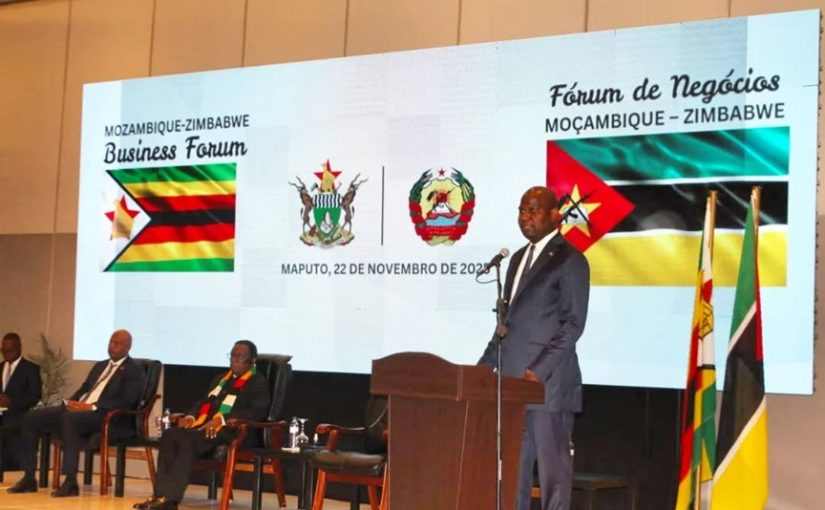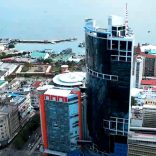Mozambique: EIB provides €10M for women-led businesses - Moza Banco
Mozambique and Zimbabwe to boost economic cooperation

Photo: Ministério da Economia
Mozambican President Daniel Chapo believes that strong investments in the private sector are crucial for economic cooperation between Mozambique and Zimbabwe, especially in the sectors of agriculture, energy and tourism.
According to Chapo, who was speaking on Saturday, in Maputo, during a Business Forum between Mozambique and Zimbabwe, which brought together businesspeople and authorities from both countries to discuss investment opportunities, agriculture is the basis of development for both countries.
“We have arable land, and our Zimbabwean brothers have knowledge, technology, and experience. This is a unique moment to discuss how we can effectively do business in this sector”, he said.
The President also highlighted energy as a priority, saying “Mozambique has gas and rivers, and we are investing to increase the quantity and quality of electricity generated. This opens up investment opportunities for Zimbabwean entrepreneurs.”
“In tourism, we can say that Mozambique is a country with 2,700 kilometers of coastline, beautiful islands, parks and reserves. It is an opportunity for both countries to develop tourism together, especially within the framework of integrated development in the Southern African Development Community (SADC) region”, he said.
For his part, Zimbabwean President Emmerson Mnangagwa said that cooperation is crucial for regional integration and logistical facilitation for bilateral economic growth.
“A country is built by its own people. Never expect that your country can be developed by others. We must eliminate barriers and increase added value in products”, he said.
Mnangagwa also highlighted the modernization of the Limpopo and Beira corridors, which are the two railways between landlocked Zimbabwe and Mozambican ports, as well as the implementation of one-stop border crossings, aiming to accelerate the flow of goods and reduce transport costs.
“We are ready to reach a crossing point where, once the formalities are completed on the Mozambique side, goods enter Zimbabwe without hindrance”, he said.
Álvaro Massingue, the chairperson of the Confederation of Mozambican Business Associations (CTA), told the Forum that trade and investment between Mozambique and Zimbabwe remain below their potential, despite geographical proximity and historical ties.
According to Massingue, between 2018 and mid-2024, Mozambique exported approximately 890 million US dollars’ worth of goods to Zimbabwe and imported only 161 million US dollars, less than three per cent of the country’s total foreign trade, while Zimbabwean investments in the country were limited to 46 projects valued at 151 million dollars in the last decade.
“We are living through a decisive moment. Bilateral relations between Mozambique and Zimbabwe have the potential to grow much more. Despite geographical proximity and deep historical ties, trade and investment between our countries do not yet fully reflect this potential”, Massingue said.
He believed that business forums between the two countries are strategic to transform potential into concrete results and greater dynamism in investment, with a special focus on facilitating cross-border business.
He identified investment opportunities in agro-processing, manufacturing, energy, tourism, and logistics, especially through joint ventures and integrated value chains.
Massingue also stressed the strategic role of transport infrastructure, highlighting the corridors and ports of Beira and Maputo as vital for Zimbabwean trade and for hinterland countries.
“By making these corridors more efficient, reducing logistics costs, simplifying customs processes and digitizing ports, we are developing not only for Mozambique, but for the entire SADC”, he said.
Massingue claimed that the ZimTrade initiative in Beira boosted bilateral trade by 23 per cent, with particular dynamism in construction and agriculture. “This type of initiative demonstrates the need for concrete business deals, realistic investments and lasting partnerships”, he said.
For his part, the Secretary of State for Trade, António Grispos, said that “Mozambique has 35 million hectares of arable land, abundant natural resources and logistical infrastructure that facilitates access to the sea for landlocked countries.”
Grispos also highlighted that Zimbabwean investors can benefit from customs and tax exemptions.
He mentioned ongoing structural reforms, such as the new Private Investment Law, the revision of the Exchange Law and the Labor Law, as well as tax incentives such as the reduction of the overall rate of Value Added Tax (VAT) from 17 to 16 per cent and the reduction of corporation tax for agriculture to 10 per cent.
“We hope that this event will serve as a platform to stimulate new trade exchanges, increase investment and consolidate economic cooperation between Mozambique and Zimbabwe,” he said.












Leave a Reply
Be the First to Comment!
You must be logged in to post a comment.
You must be logged in to post a comment.